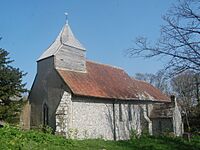Church of St Peter ad Vincula, Folkington facts for kids
Quick facts for kids Church of St. Peter, Folkington |
|
|---|---|
| Church of St. Peter ad Vincula | |

"delightfully situated under a wooded slope of the South Downs"
|
|
| Lua error in Module:Location_map at line 420: attempt to index field 'wikibase' (a nil value). | |
| Location | Folkington, East Sussex |
| Country | England |
| Denomination | Church of England |
| History | |
| Status | Parish church |
| Founded | C13th century |
| Architecture | |
| Functional status | Active |
| Heritage designation | Grade I |
| Designated | 30 August 1966 |
| Architectural type | Church |
| Administration | |
| Parish | Folkington |
| Deanery | Lewes and Seaford |
| Archdeaconry | Brighton and Lewes |
| Diocese | Chichester |
The Church of St. Peter ad Vincula is a very old church located in Folkington, East Sussex, England. It was built way back in the 13th century, which means it's over 700 years old! This church is made from strong materials like flint and rubble. It's also a special "Grade I listed building," which means it's considered a very important historical building in England. People still use it as an active church today.
Contents
History of the Church
Early Beginnings
The Church of St. Peter ad Vincula first started in the 13th century. Inside the church, you can see some beautiful monuments from the 18th century. These are like special sculptures or plaques that remember people who have passed away. There are also old-fashioned wooden seats called "box pews" and a "pulpit," which is a raised stand where the priest speaks.
Changes Over Time
The church had some small repairs and updates in 1870. A musical organ was added in 1917. This organ was a gift from Mary Earle Gwynne, who lived in Folkington. She gave it to remember the brave men from the village who died in World War I. The church is still an active place of worship today.
Notable Graves and Art
The churchyard, which is the area around the church, has the grave of a famous cookery writer named Elizabeth David. Her grave is marked by a special stone carved by a local stonemason in 1992. Just inside the church door, on the left wall, there is a small stone sculpture. This artwork was made by a sculptor named John Skelton (sculptor) for the family of Ronald Stacy Marks.
Church Design and Materials
Building Materials
The Church of St. Peter ad Vincula is built using flint and rubble. Flint is a hard stone, and rubble means rough, broken pieces of stone. These materials make the church very strong and sturdy.
Unique Features
The church has a special bell tower that is covered with "weatherboarded" wood. This means it has overlapping wooden boards that protect it from the weather. The top of the bell tower has a small, pointed roof called a "shingled spirelet," which is covered with wooden shingles. Because of its historical importance and unique design, the building is officially listed as Grade I.

